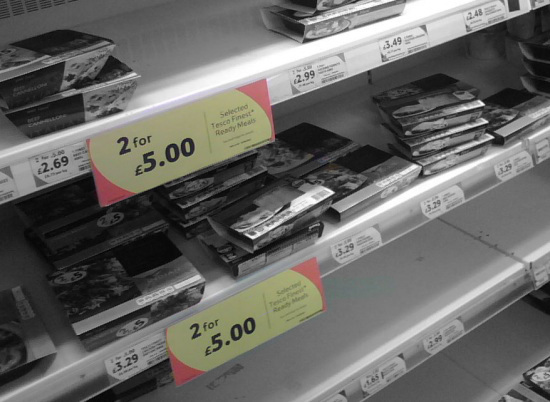In the current economic climate, saving the pennies and keeping costs down is incredibly important for most families in the UK. With disposable income for the average family struggling to cover all essentials, comparing prices of everyday items in order to get the best deal has become something of a routine for consumers in their local commercial property supermarket.

However, according to a recent study by consumer champions Which?, supermarkets themselves are hardly going out of their way to make saving money easier for their customers, with misleading labelling causing comparison confusion in stores across the country.
The problem usually occurs in the fruit and vegetable areas of supermarkets, where customers are faced with the choice of buying their items loose or as part of a multipack. Now, the rule of thumb is that loose items are generally cheaper than buying, for example, a three pack of peppers, yet this is not always the case, so consumers are advised to check the pricing if determined to bag a bargain.
Unfortunately, this is not as easy as it appears. As supermarkets routinely offer multi packs of fruit or vegetables without a clear price comparison with the loose items, the weekly shop can become a time consuming ordeal due to the fact that making a quick assessment of value for money is virtually impossible.
This is why Which? are calling for the government to step in. They believe that a change in the law, applicable to all retailers, would allow consumers to save money and make shopping a more economically viable experience.
Under Which?’s guidelines, retailers would be required to display clear unit prices, based on a formula such as pence per item. Shelving labels should be written in large text against a clear background in order to provide better clarity for customers.
Also, in a previous Which? survey, the consumer champions found that three in four shoppers believe that supermarkets will try to deliberately mislead them on prices. Perhaps, should Which?’s suggestion for a change in legislation be accepted, a greater trust will be placed in supermarket chains by consumers, thus boosting revenue in a time where all retailers are finding it difficult to encourage shoppers to part with their money.
Technically, stores currently have to display unit prices on shelves, but in a spot check of the top ten supermarkets conducted by Which?, it was found that none of them met the best practice criteria for labelling. This pertains to the size and legibility of the displayed unit pricing, with the letters too small to read clearly in most cases.
This is why Which? have launched the Price It Right campaign, stopping supermarkets from misleading their customers in the future.
Which? executive director, Richard Lloyd, said; “With household budgets squeezed and rising food costs among the top worries for consumers, it’s all the more important that stores make it as easy as possible for people to spot the best value products.”
In fact, Morrisons has already signed up to the campaign, with planning already in place to make labels clearer and unit pricing more prominent in promotions. It has pledged to introduce standard large labels to all items, showing the unit price and also the price per kilo or litre, by the end of 2013.
Dalton Philips, chief executive of the supermarket giant, said; “By doing this we believe we can restore trust in supermarket prices.”
Do you believe that supermarket commercial properties in the UK will get behind the Which? campaign in order to make the weekly shop easier for their customers? Or do you think that large chains now think they have to trick consumers into paying higher prices for identical items, thus boosting their own revenue, in order to remain profitable?
Previous Post
What will Happen to the Olympic Venues Now?